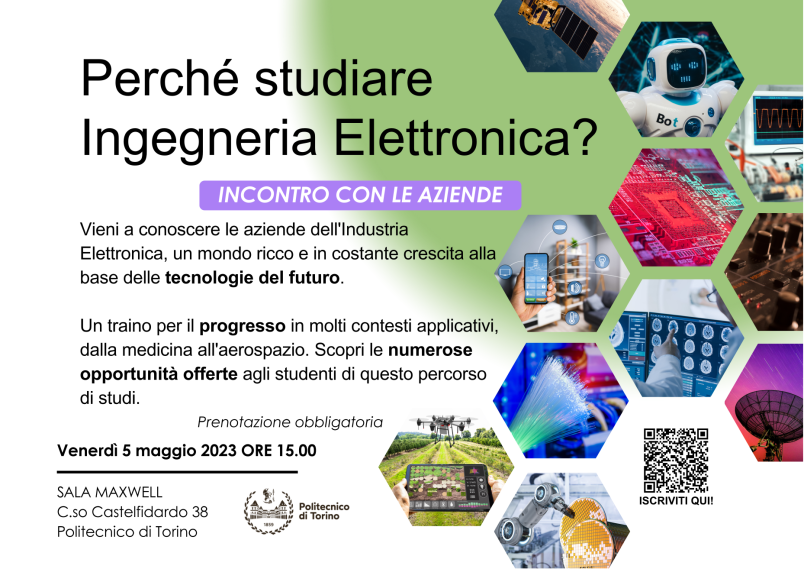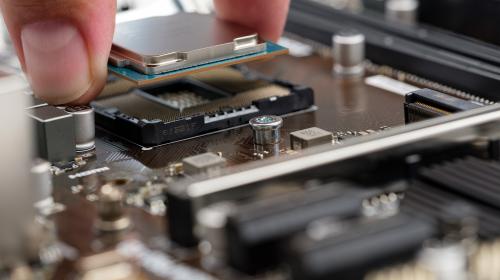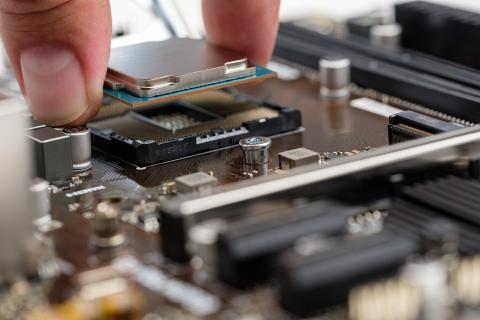
"What impact does electronic engineering have on the progress of society? What is its technical, scientific, and ethical contribution? What are the opportunities for development in our world, promoted by investments in the new European Chip Act, and what are the responsibilities?"
On Friday, May 5th, 2023 at 3:00 pm, the Department of Electronics and Telecommunications of the Polytechnic of Turin hosted a group of internationally relevant companies operating in the electronics sector to share a perspective on the impacts of this branch of engineering on our daily lives. An exclusive forum, dedicated to high school students to meet industry representatives from all over Europe. The event was designed to give voice to the protagonists of some of the most significant changes in the technology sector in recent decades.
There were two distinct moments: a first part in which the guests presented to the students their role in the reference sectors, and a second in which a dynamic debate was opened. A space for discussion was thus defined to allow the present students to understand what the concrete possibilities are to become part of the progress of the modern era and to face the challenges that it proposes to us. From medicine to the aerospace industry, from advanced agriculture to the search for new devices, with particular attention to social implications and responsibilities.
The companies that took part in the initiative are as follows: Allegro MicroSystems, Analog Devices, Argotec, ARM, Bosch Sensortec, Capgemini, Crea, Ideas&Motion, Infineon Technologies, Inventvm Semiconductor, Marvell Technology, Move-X, NXP Semiconductors, Punch Softronix, Qualcomm Technologies, STMicroelectronics, Synthara AG, TDK Electronics, Telsy, Teoresi, Vishay Semiconductors.
-------
Event organized by the Boarding School of Electronics, Telecommunications, and Physics, as part of the orientation activities for the bachelor degree in Electronic Engineering, in collaboration with the IEEE PoliTO Student Branch.

What are the most sought-after job roles in the field of electronics at the moment (and in the near future)? Is Digital Designer still a role that is in demand or are we moving towards other figures? Regarding testing, are there more sought-after skills than others?
Synthara/Aimar. The number of digital designers is not decreasing, on the contrary. With the increasing complexity of chip designs and the number of companies venturing into creating their own custom designs, the demand is very high. For testing, high-level verification engineers are even more sought after than designers. Specific skills vary from role to role, but certainly a good understanding of UVM is an important starting point. In general, a good verification engineer must often be as practical with hardware as with software.
Advantest/Crea. In CREA in Ciriè (TO), we design and produce test systems for power semiconductors (ATE). All parts of our product are designed internally, so in our R&D group, we have a great need for electronic designers for the development of our stimulus and measurement modules (SMUs), the communication and synchronization infrastructure of the system, control units, for which the most sought-after skills are analog electronics, power analog, signal conditioning, embedded, as well as digital electronics. An important figure in testing, which is transversal and is not directly employed in the project, is the application engineer, that is, the person who is an expert in the use of our systems applied in the testing of our customers’ devices. They must know electronics and power devices and English, as they often speak directly with customers.

Seeing that all the speakers are male, are there the same chances of reaching important roles being girls?
Convergent. The fact that most of the speakers are male reflects the fact that when we graduated, there were really few girls in electronics, about ten out of a class of 300. In my experience, limited to my perhaps enlightened context, women can reach important positions if they are valid. I could venture that electronics, being a dynamic and new reality, is a degree in which women have more opportunities than in other historically male fields.
Synthara/Aimar. In my personal experience, the semiconductor industry is not discriminatory. The main reason why the speakers were all men is very statistical, related to the fact that after more than 30 years in which female students in electronics were few, the management has evolved to represent the same statistics. If enrollments were 50/50 between women and men, the distribution would quickly converge to 50/50.
Advantest/Crea: I confirm the considerations of my colleagues. I absolutely think so.

What are the requirements and how can you start a career with the companies present?”
Analog Devices. Professors can certainly better support and guide students in the internship/thesis path than anyone else and are therefore the main interlocutors for students in the last years of study. Then each company has its own Careers/Job/Lavora-con-noi section on which to start browsing.
Synthara/Aimar. Each company has its own peculiarities, so it is difficult to establish a common path for everyone. Usually, all companies in the sector have a dedicated web page to apply for various positions, and often your teachers are able to introduce you to specific projects that are looking for personnel. One suggestion I have is that if you are aiming for a particular company, try to enter for the master’s thesis as an excellent way to showcase yourself.
Advantest/Crea. For our Ciriè (TO) office, we are actively looking for recent graduates in electronic engineering, even before graduation with curricular internships, thesis development, high-level apprenticeships. If you are interested, please contact us through your teachers or by writing directly to humanresources-crea@advantest.com.

Can the time taken by a person to graduate in Electronic Engineering, regardless of their passion and commitment, negatively affect their chances of employment and future career?
If the graduate demonstrates in an interview that they are valid, there are no problems in hiring a person who has taken a longer path.
Synthara/Aimar. Usually, the time taken to graduate is not a criterion used to analyze a CV, especially if justified (e.g. if one maintains work during studies). The most relevant criterion is the final average with which one graduates, especially for high-level companies that receive hundreds of applications and must make an initial selection.
Advantest/Crea. At our headquarters in Ciriè (Turin), we also consider the duration of studies when evaluating CVs. In work as in study, time is a factor with which one must measure oneself to bring results or to abort the project. Therefore, for us, unless there are justified reasons (for example, having pursued a study and work path simultaneously), the grade and the time in which it was achieved are parameters (not the only ones) that influence the evaluation of CVs.
Allegro Microsystems. From our point of view, the duration of studies or the grade of graduation are almost irrelevant factors. We are not a big company, so we are obliged to make a certain selection before hiring, but we have had cases where we did not hire people with a PhD or high-level CV and hired people with less “substantial” CVs, simply because they demonstrated to be more prepared and brilliant in the technical interview.

How difficult is it to change/try different roles within your company?
Analog Devices. “Job Rotation” is a virtuous practice implemented by companies to promote the transfer of skills and give their employees the opportunity to explore different areas.
Synthara/Aimar. Any “serious” company is aware that “boring” its engineers is a great way to lose them, so there are often programs to sponsor internal dynamism. At Synthara, we update each engineer’s personal objectives once a year, so that we can plan gradual role changes to satisfy both individual and company needs.
Convergent. When a company is not very large (for example, less than 50-100 people), it is easier for one’s role not to be excessively static and to have to work on several different projects. Furthermore, knowledge of electronics lends itself, being transversal, to be useful both for R&D and automatic measurement systems in production, to make and understand optoelectronic characterizations of semiconductor diodes…
Advantest/Crea. I have always been personally convinced that the most important resource in any organization is people. And that problems are more about communication and understanding than technical ones. As head of R&D and human resources for the Ciriè business unit, I am pleased that at the corporate level this year we have moved from “Human Resource” to “Human Capital,” which highlights the entire group’s attention to this important issue. In this context, the possibility of changing roles or positions in our company is framed. In the search for the best from everyone, this also means identifying the position where one’s talents can be best expressed or where the individual intends to engage in a personal growth path. In our Ciriè headquarters, having R&D and doing the project of complex systems internally, we have several segments where an electronic engineer can grow and contribute, from digital electronics, to analog and power electronics, to embedded systems, with teamwork where the exchange of skills is required and favored. Up to the possibility of managerial roles and exchange with other R&D groups of the ADVANTEST group and participation in major international technical conferences as speakers or audience.

What master’s degree did you do? Did it influence your work or did you take different paths?
Convergent. My degree is in physical engineering and, like electronics, it is very broad in terms of possible applications. I have former classmates who have done a PhD, others who work in both R&D and production of highly technological companies (as in my case), and still others who have completely changed fields by entering more into sales or management. In the end, an engineering degree provides a knowledge base and a way of approaching problems that is sought after by many companies, then personal nature can make the difference.
Advantest/Crea. I studied computer engineering and have always worked in the field of automatic test systems (ATE). the two things have always gone together
Synthara/Aimar. My path has been quite varied, I started with a bachelor degree in physical engineering at Polito followed by a master’s degree in nanotechnologies between Poli, Grenoble INP and EPFL Lausanne. Later I worked for a couple of years at Imagination Technologies in the UK on the GPU PowerVR architecture that was integrated into the iPhone at the time - and then returned to academia to obtain a PhD in AI/Neuroscience/Electronics at ETH Zurich/University of Zurich. In general, the master’s degree provides a consistent direction but at a macro level, i.e. it directs the general field in which you want to work. From there on, there is a lot of flexibility on which path to take. One suggestion I have is, if you want to do a job after your master’s degree that is not strictly related to your field of study, prepare for job interviews: if you want to apply for a deep learning position as an electronic engineer, spend a few months studying the topic first. Don’t show up mute at the interview.

What is the difference between an electronic engineer and a person with great knowledge of electronics (and therefore experience)?
Advantest/Crea. Studying increases the chances of success. And it should not be underestimated. It’s like the difference between a self-taught athlete or musician and one who has studied that sport or instrument. There may be natural talents, but they are exceptions. Experience helps, like practice in sports or music, so that the baggage of knowledge and personal skills can be transformed into results.
Allegro Microsystems. Certainly, having great experience is useful and often necessary, but the engineer generally tends to have a great theoretical preparation in their own field, and this can make a big difference. What typically happens is that, in trying to solve a problem, the person with great experience proceeds intuitively, while the engineer proceeds more systematically and methodically.
Synthara/Aimar. Theory is important. It’s an uncomfortable reality that is often put aside, especially in Anglo-Saxon/American/Indian engineering schools. But without a strong theoretical foundation, at most you can solve today’s problems, in the short term, but in the long term you will end up losing ground to those who, thanks to their theoretical knowledge, are able to adapt more quickly to new technologies.

Is a master’s degree important in this field?
The master’s degree is not essential to find work, as offers arrive already during the bachelor degree, but the positions that can be accessed change significantly. A three-year electronic engineer is more frequently employed in sales and support and only rarely in design positions.
Analog Devices. The entry framework changes, obviously with the Master’s degree you enter with a higher level and salary, but the role you can access often changes as well: ADI in Italy in the Design field mainly hires with a three-year degree for Layout Engineer positions.
Synthara/Aimar. From the point of view of a small company, having a master’s degree or not has a significant impact: since the teams are very small and the deadlines are close, there is often no time to grow a three-year graduate internally, so someone with a complete master’s degree is preferred.
Advantest/Crea. Personally, I believe that the master’s degree is important, but not for this field or to find work, but because it is important for oneself. I mean that studying is an opportunity that one has in a certain period of life, which is difficult to repeat, and that accompanies you throughout your life. If you have the opportunity and you like it, study.
Allegro Microsystems. Without a doubt, you can also find work with a three-year degree, but the big difference between a three-year and a master’s degree is that the three-year degree allows you to analyze and understand work designed by others, while the master’s degree enables you to design new things from scratch. Clearly, job opportunities change precisely in light of this difference.

Is the path chosen during university limiting for job selection or for being hired in a specific sector?
Synthara/Aimar. It’s a difficult question to answer because it varies from case to case. Some flexibility is always possible, especially for recent graduates. During interviews, Synthara is very open to people with a background that is not strictly aligned with the position in question, as long as the person has prepared adequately (e.g. we are currently interviewing a mechanical engineer who studied AI independently of university).
Advantest/Crea. I would define university studies as “propaedeutic” rather than limiting. It is undeniable that the knowledge gained is helpful for employment in that particular sector, but the fields of application are always very broad in any path you choose. Furthermore, I believe that university education provides tools for learning rather than limiting the use of the knowledge acquired.

In 5 years, when we finish our studies, what will the job market in the electronics sector look like given the advancement of artificial intelligence (AI)?”
Synthara/Aimar. As Synthara, we obviously hope that this will bring much more work in electronics. In general, AI has revitalized the sector, changing some paradigms that seemed immovable. As AI-based tools spread, the work of the electronic engineer will change little by little, with some tasks that will be completely automated (ChatGTP already works wonders when it comes to writing small modules in SystemVerilog) and the focus will shift towards higher-level tasks.
Advantest/Crea. I believe that the job market in the electronics sector is very broad and constantly growing. In 5 years, it will be even more so, and artificial intelligence will be one of the employment possibilities. I don’t know if the question also contained a fear, but I have enough experience to say that even in the past, some technologies were thought to be “substitutive” of human skills (see robots or more recent cobots), but it didn’t happen and it won’t happen in the future with other technologies, but there will only be different jobs and different job opportunities.

Are there any specific courses or skills required to work in the aerospace field?
Argotec. Absolutely not, specific knowledge for the sector overlaps with knowledge that is naturally learned during the course of studies. What is obviously very useful is to have the flexibility to range between the different faces of electronics (digital, analog, power, radio frequency, etc.) to be able to tackle the development of a complex electronic system at multiple levels.

Would you define the job opportunities for male and female graduates as “equal”? And similarly, how wide is the gap between the two sexes in the field of electronic engineering?
Synthara/Aimar. Speaking from the “male” side of the story, I have never witnessed gender discrimination in the sector. On the contrary, speaking with other managers, I have often heard of how various companies try to favor female graduates over their male counterparts, as far as possible, in order to create a more balanced work environment. It is true that women are still in the minority in the sector today, but the reason is more to be found in the few women who come out of university and not in company discrimination.
Convergent (young woman). I think it depends a lot on the company, the group, and one’s own manager. In highly technological companies, it is easier to have a good approach compared to, for example, more mechanical fields. However, times are improving, women are still very few at the top, but I am optimistic that it is only a matter of timing. After all, the men at the top also have a certain age. The problem is not only a female one, but also of leaving space for young people. In other European countries, the average age of people with responsibilities is lower.
Advantest/Crea. In our organization, I can say that opportunities are equal.
Synopsys. At this historical moment, the issue of inclusion is receiving particular attention worldwide. Our sector is certainly no exception, and I can safely say that all profiles are evaluated in the same way: males and females have the same opportunities, the same economic treatment, and the same career opportunities.

Is there a role for an electronic engineer that allows you to work more closely with people?
Synthara/Aimar. In 2023, any electronic engineer who works alone in his bubble is doing something wrong - either he or his company. A good electronic engineer must regularly communicate with his design team, verification team, physical implementation team, managers, customer support… I have heard more people complain about excessive human relationships than their lack. Furthermore, for those who really have human contact as their goal, companies hire “FAE” (Field Application Engineers) who provide technical support to the customer and are regularly in contact with their representatives.
Advantest/Crea. Electronic project work is done in teams, so opportunities for contact with people are daily. Different if you mean contact with people outside the company. In that case, there are different commitments from the project, always for electronic engineers, which can range from the more typical technical support to sales, application engineering, project management, up to sales or management, where contact with people and communication skills are predominant. We need all these figures that I have listed in our Ciriè headquarters and in our global organization.
Synopsys. If by “working closely with people” you mean with customers, the most suitable roles are those of FAE or Marketing (who contacts customers and discusses the commercial aspects of a possible business). To stay on the more technical roles, however, I can safely say that even the designer, as part of a team, has many interactions with colleagues, both from the same site and remotely with other countries.

How important is knowledge of foreign languages for collaborations with foreign countries? Is English sufficient?
Convergent. In my experience, when in contact with Singapore, the United States, and England, good English is more than sufficient. The technological world speaks English everywhere, also because it is a high-level context and outside of Italy, at the scientific degree level, English is spoken fluently everywhere.
Synthara/Aimar. The language of electronics is English (with all due respect to the French). In an ideal world, knowing Mandarin Chinese can allow you to interact with that part of the world, but essentially no Westerner is able to do so.
Advantest/Crea. English is sufficient and necessary.

In which of your programs do Embedded applications find space? What kind?
Advantest/Crea. At our Ciriè headquarters, we carry out research and development activities for power semiconductor test systems. These are complex systems, not only in terms of measurement, but also because they must operate in production environments and with disturbances arising from the application itself with high voltage and high current switching. By making a product that is completely designed internally, all hardware management for stimulation, measurement, and communication is developed using embedded Linux and RTOS operating systems on dedicated and distributed dual microcontrollers. We already have electronic engineers with an embedded background, but we have an extreme need to strengthen our staff with embedded skills.
Synthara/Aimar. Synthara’s mission is to bring AI to the embedded world.

How are people trying to break the prejudice against engineering and STEM subjects, which are seen as paths for men only? What are companies doing about this? The shortage of personnel could be partly solved with this.
Synthara/Aimar. Ironically, until the 1970s, STEM fields were dominated by women before there was a big change that brought men to dominate the sector. In recent years, there has been a reversal of this trend, and women are returning to more scientific subjects. Unfortunately, at the corporate level, it is not easy to counteract these types of stereotypes that have a broader and “social” origin, but on multiple occasions, I have had the opportunity to address the issue with other managers, and I can guarantee that it is a very important issue.
Convergent. People are needed, and companies do not have any problems (and if they do, then they are companies that do not deserve it) as long as people prove to be valid. However, the first step must come from families-universities-society to not discourage enrollment in STEM courses, also because, precisely, they are among the most requested and well-paid knowledge available. So: enroll, and there is already a job waiting for you.
Advantest/Crea: In our project team in Ciriè, we have a significant female presence. During interviews, we do not consider gender to be influential at all, and we have found that by giving confidence and work opportunities even in the case of young female engineers who want to face the double commitment of motherhood and work, we are rewarded with commitment and results. We are evaluating what measures can favor the insertion of new female talents in our company and in our territory, in addition to salary, for example, to alleviate the impact of infrastructure problems, such as a contribution for housing or for the nursery.

I like electronics, but I would like to work in areas of social utility to help people. Are there any opportunities like this?
Analog Devices. There are integrated circuits and systems for medical applications. In the automotive sector, passenger and pedestrian safety is essential, and telecommunications guarantee the transmission of data, often of vital importance… as an Electronics Engineer, you will be qualified and have the tools and skills to work in areas of social utility, and the choice will be yours!
Advantest/Crea. Many electronic devices are for social purposes, from electromedical devices to those for saving people’s lives, just to name a few. Then there are various associations (I mention SERMIG in Turin as a pure example) of volunteer activities for which the skills of the electronic designer may be necessary for some projects.

Considering that support from the government is very important for research and development sectors (for example, from an economic perspective), what has been the response from the Italian government in recent years?
Synthara/Aimar. Strategic initiatives in the economic sector are more of an EU competence than an Italian one, and in this context, the EU is pushing hard on electronics. I will let Italian colleagues comment more in detail on the topic, but I can comment on what my feeling is as an Italian abroad. Unfortunately, Italy suffers from terrible and Byzantine bureaucratization, to the point that it has ended up defeating the very reason it was created (an example is labor legislation, born with the noble intent of regulating the labor market but which has no equal in complexity and has produced the most static salaries in Europe). This unfortunately has a negative impact on research and development activities, which by definition require high levels of dynamism and flexibility. I would like to conclude with a note of optimism, but honestly, I do not see any changes on the horizon (regardless of the political color of the elected government, as it is a systemic problem related to the undergrowth of public bureaucrats in each ministry). It certainly does not help that as much as Italian engineers are excellent (and it is not a stereotype, comparing Italian graduates with those from France, Germany, or Spain, there is sometimes an impressive gap), most of the companies in the sector are foreign, and therefore more likely to change country than to act to change the situation locally.Then, if you want, we could start talking about the positions of each political party… but for the purpose of this board, it is better to leave that debate to another venue.
Advantest/Crea. We at CREA can testify to a positive example of facilitation for research and development, in the form of a tax credit, with Por FESR funds through the Piedmont Region in a supply chain project with other international companies, but based in the area, and the Polytechnic of Turin. Thanks to this three-year project, we were able to develop a new test system architecture and a new hardware infrastructure that will allow us to develop new testers for the needs of the market in the coming years. It also allowed us to hire students who have not yet graduated with the tool of apprenticeship in higher education. I say this by prefacing that I was among the skeptical entrepreneurs about the possibilities that public tools can work and happy to have had the opportunity to change my mind. The lesson I think I learned is that if you want something, you have to be the first to believe in it: in the value of playing as a team and being optimistic that there are other players who want to play with you.

Does studying electronics abroad make a difference for working in an electronics company compared to studying in Italy?
Convergent. Rather than Italy/abroad, we could talk about universities. Some universities, even if they remain in Italy, are more prestigious than others, and this COULD count for something in an initial selection among recent graduates with practically, rightly, empty CVs. In Italy, the training is very good (there are many Italians in important research groups and companies abroad), although it is sometimes very theoretical. Sometimes, abroad, there are more opportunities to do practical exercises, but they are less in-depth on the theory behind them. This always applies in general. However, I did an Erasmus, an experience abroad is always nice and useful, also to show that you have a certain level of English (without certifications) and autonomy in managing yourself in new situations.
Advantest/Crea. The world of electronics, the world in general, and companies are increasingly international. For us at CREA, skills are important, but so is the desire to apply oneself, to be interested in the project, to be part of the group that wants to achieve that result. And knowledge of the English language is certainly necessary. These things can be learned by attending both foreign and Italian universities. The Polytechnic University of Turin is an excellent school to study electronics. We give new graduates hired by us at CREA the opportunity to go to our customers around the world to see where our systems are installed and applied to complete the training and internationalization of the technical figure.
Synopsys. Premise: an experience abroad is always important in a person’s life because it allows you to broaden your horizons, perspectives, and I believe it is an important step in personal growth. That said, I do not associate this discussion with the educational aspect. Italian universities are of a very high level, and the many foreign engineers that I have met in my career have NOTHING TO ENVY to Italians (if anything, the opposite is often true).
Synthara/Aimar. I fully support Synopsys’ colleague’s importance at the experience level of spending a period abroad. In general, every serious selection process gives a minimum weight to the university, and what counts is what is seen in the actual interview. That said, not all universities prepare in the same way, and if the Polytechnic of Turin provides preparation on a par with other great European institutions, the same cannot be said for all Italian universities.

Will the way of making (consumer) electronics change based on the challenges that the ecological transition will represent in the near future?
Synthara/Aimar. Electronics has already changed a lot as a result of the ecological transition. On the websites of semiconductor companies, the most used keyword is “low power”, followed by “ultra low power”. Being low energy consumption is now one of the main requirements for most microchips, and is today one of the main driving forces of the industry.
Advantest/Crea. Electronics is the protagonist of the energy transition and the sustainable development of the economy of the near future. Not only infrastructure such as systems and equipment for converting energy from renewable sources (solar and wind), transport, and charging, but also consumer products: electrification of transport (not only cars, but also buses, trucks, and ships); electrification of consumption (electric boilers, induction cooktops, …). Not only a new way of making electronics for existing consumer products to reduce energy consumption, but also electronics for new consumer goods that require new companies, new skills, and many new electronic engineers.

What are the prospects for our country, and, if you know, for Turin, to attract more important companies working in the electronics industry in the future?
Analog Devices. The presence of so many companies (normally in competition with each other in business and recruiting), sitting on the same side in this meeting so that the Polytechnic of Turin can attract talent and train new engineers, is certainly a recognition of the perceived value of the Polytechnic of Turin and an indication of excellent prospects for Italy and Turin.
Synthara/Aimar. As commented in another response, Italy has great human potential, and this makes it extremely attractive to large companies that spend time fighting for the best engineers. Unfortunately, there is a need to work on all administrative and infrastructure aspects (and here Turin is an example of Italy’s ills, in which other city in the world would the metro have been made to arrive at the Torino Lingotto shopping center instead of the Torino Lingotto Station?). If we want, this is a reminder to all young people who want to become engineers that no one lives in a bubble, and that it is necessary to be interested in the development of society around us in order to be able to work as and where desired.
Advantest/Crea is a virtuous example of an electronics company that has managed to attract important companies in the Turin area. CREA was founded in 1992 and has always designed and produced test systems for power semiconductors, which have now exploded with the electric car market. Since last year, we have been a business unit of ADVANTEST, a Japanese multinational that is a world leader in the same sector, but lacked the technologies and skills that were in CREA. We have our headquarters for production and research and development in Ciriè, near Caselle airport. With the Polytechnic of Turin, we are designing a new patented test system architecture that can be successfully applied in the next 10/20 years. The Polytechnic of Turin has decided to inaugurate a Japan HUB in Kyoto next July, which we aim to use to train and attract international technicians. Our customers are the major producers of electronic components worldwide, one of which is Italian-French and others have offices in Italy. The Italian government is about to launch a Chips Act shortly. I would say that there are all the ingredients and tools for a promising future for electronics in Turin and Italy.

What is the difference between electronics and computer science if programming and codes are also discussed in electronics?
The typical programming of an electronic engineer is particularly close to hardware: assembly, C, and C++ are used, which are languages in which the programmer has direct visibility into what happens in the processor’s registers. Instead, computer scientists have hegemony over higher-level programming, which is often specifically unaware of what happens in hardware because it must be compatible with very different machines. Obviously, there are exceptions to this rule, and there are still many electronics engineers who learn high-level programming languages (e.g. Python) to support their activities. It is generally easier for an electronic engineer to learn a high-level language than for a computer science engineer to learn a low-level one.
Advantest/Crea: Both computer science and electronics have broad and diverse application fields. Depending on personal experiences and predispositions, the boundaries can also be crossed in both directions in working life, but there remain basic knowledge and skills that differentiate them and make them more suitable depending on the application area. At CREA, we design and produce automatic test systems, and we have both computer scientists and electronics engineers who write code: the former more for the user interface (the software used by the end users of the system), the latter more for the so-called firmware (the code to make the hardware work). An example of a borderland is real-time systems. To write good RTOS code, you need to have a good knowledge of hardware architecture: can computer scientists do it? Yes, but electronics engineers generally do it better.

Given that many companies work in the field of artificial intelligence, which seems to be based on computer codes, why choose electronics instead of computer science to work in the field of AI?
Artificial intelligence algorithms still require hardware to run on, whether it is a local device or a server somewhere in the world (which is what happens when talking about cloud algorithms). No matter how much progress AI makes, it will always be limited by the capabilities of electronics, so it is essential to continue developing new solutions in data processing and transmission.
Synthara/Aimar. It may seem surprising to those who are not in the field, but AI is not at all complicated at the code level. Incredibly complex models like ChatGTP can be summarized in a few hundred lines of code, and the mathematical principles behind them date back to the 90s if not the 80s. As a result, very few AI experts are computer scientists, but are mainly Data Scientists and, surprisingly, electronic engineers. The reason is that hardware is still the main limit for the development of AI, and all the progress we are making is related to the improvement of our computing architectures. In this context, where custom circuits decide what can and cannot be done, computer engineers have a lesser role than in the past, leaving room for Data Scientists (who may not be perfect programmers, but a PhD in computer science is not required to write 100 lines of code) and hardware experts.

Given the need for innovation, is studying electronics also suitable for more creative people who are less attracted to working only behind a computer?
Analog Devices. Assuming technical skills and familiarity with theoretical concepts, intuition often comes from what we do in our daily lives, and creativity always has its field of application.
Synthara/Aimar. The answer is divided into two parts. To begin with, unfortunately, the work of an electronic engineer is mainly done in front of a screen. Even those who work at a higher level and perhaps do not directly design end up spending most of their time on the computer. However, this does not mean that it is not a creative job, on the contrary. An analogy that comes to mind is that of a sculptor, who technically spends his days staring at stones and ends up creating Michelangelo’s David. Although computer work is not associated with creativity, a good part of the work of an electronic engineer is finding solutions to new problems that no one has ever thought of before, inventing something that would otherwise never have existed.
Advantest/Crea. The computer is a widely used tool in many jobs, including creative ones: I imagine it is also used by those who write books or compose music. Creativity is certainly important, as is intuition, in carrying out engineering work: if you are lucky enough to work for companies that design and know how to capture and enhance this talent, it is definitely an added value. My personal opinion is that, however, an electronic designer is expected to have tools that are beautiful, innovative, but still useful (such as a smartphone). I don’t think creativity can be applied only to artistic or communicative aesthetics.

How will electronics change with quantum computing?
Advantest/Crea. It seems to me that QC is still a technology to be developed. Therefore, I don’t think it can be said today how electronics will change with QC.









